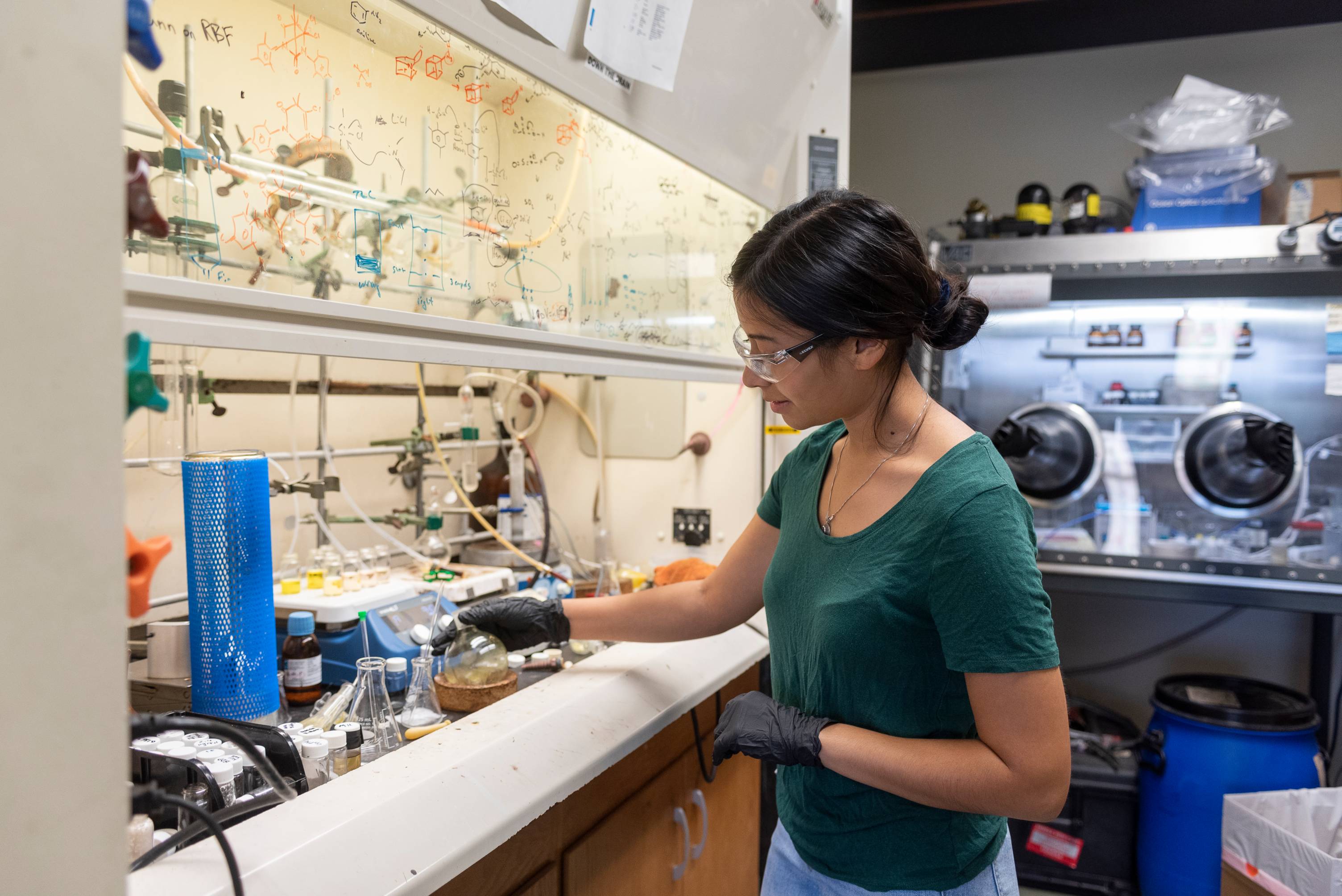Integrated Molecular and Biophysical Chemistry (Ph.D.)
Ph.D. Integrated Molecular and Biophysical Chemistry

Program Overview
The Integrated Molecular and Biophysical Chemistry (IMBC) program will train Ph.D.-level biochemists, biophysicists, and chemists for the growing biomedical and life science industry in Texas and the nation.
Through a focus on the chemistry and biochemistry of natural systems, this program features interdisciplinary course work that integrates biochemistry, biophysics, organic synthesis, medicinal chemistry, cell biology, biological chemistry, and molecular genetics. Uniquely, students will be prepared to enter the industry workforce, with a foundation in business fundamentals, leadership, and innovation training both in the classroom and through business boot camps.
The cross-disciplinary training in the IMBC degree program leverages the potential of commercialization and industry collaboration within the Texas Innovation Corridor with departmental expertise in biochemistry, biophysics, organic chemistry, and molecular biology.
Course Work
IMBC students will be prepared for the growing biomedical and life science industry in Texas and the nation. The program features interdisciplinary course work that integrates biochemistry, biophysics, organic synthesis, medicinal chemistry, cell biology, biological chemistry, and molecular genetics through required and elective courses.
Uniquely, students will also build a foundation in business fundamentals, leadership, and innovation training both in the classroom and through business boot camps. The cross-disciplinary training in the IMBC program leverages the potential of commercialization and industry collaboration within the Texas Innovation Corridor with departmental expertise in biochemistry, biophysics, organic chemistry, and molecular biology.
Course work is centered on research, with both pre-candidacy graduate research course work and substantial post-candidacy dissertation research courses. Students with prior graduate degrees or experience may transfer credit or waive requirements with approval.
| Degree | Course Work | Dissertation | Total Hours | Location |
|---|---|---|---|---|
Degree Ph.D. | Course Work 36 hours | Dissertation 36 hours | Total Hours 72 hours | Location San Marcos |
Program Details
This program provides advanced training in the chemical life sciences, including but not limited to organic synthesis, biochemistry, biophysics, and cell biology; fundamental business skills of leadership, innovation, and entrepreneurship; and responsible conduct of research, including research ethics, scientific communication, grantsmanship, and interdisciplinary collaboration.
Program Mission
Our mission is to prepare graduates to lead interdisciplinary teams that make impactful advances in the biomedical and life sciences by equipping them with:
- comprehensive technical knowledge spanning synthesis, biochemistry, and biophysics;
- advanced research skills to allow them to design and implement experiments to test
- hypotheses and engage in multidisciplinary research in the molecular sciences;
leadership, innovation, communication, and entrepreneurial skills to prepare them for multiple career environments.
Career Options
IMBC graduates can embark on a variety of career paths including as:
- faculty members in public and private colleges and universities
- entrepreneurs and founders of start-up companies
- scientists in private companies, nonprofit, or government agencies
- intellectual property professionals, consultants, or managers
Program Faculty
The IMBC faculty research areas include:
- DNA damage and repair
- regulation of gene expression
- cellular mechanisms of carcinogenesis
- molecular mechanisms of disease
- natural products synthesis, drug design and discovery
- liquid-liquid phase separation of proteins and nucleic acids
- drug delivery and biosensors
- research training and education pedagogy
- enzyme mechanism, chemical catalysis, and inhibition
- analytical methods development
Contact us for general questions about your application, funding opportunities, and more. If you have specific questions after reviewing the program details, contact the program's graduate advisor.
Graduate Advisor
Dr. Karen Lewis
IMBC_PhD@txstate.edu
Graduate Advisor
Dr. Sean Kerwin
smk89@txstate.edu
512.245.1056
Centennial Hall, Room 403

Apply Now Already know that Texas State is right for you?
Application Deadlines
| DEADLINES** | U.S. CITIZEN | INTERNATIONAL |
|---|---|---|
DEADLINES** Fall - Priority | U.S. CITIZEN February 1 | INTERNATIONAL February 1 |
DEADLINES** Fall - Standard | U.S. CITIZEN June 15 | INTERNATIONAL June 1 |
This program's deadline is firm. This type of deadline means the application and other application requirements must be submitted by the program's specified deadline day.
**Applications for Fall 2025 entry are closed.
|
|
Funding Information For scholarship, fellowship or assistantship consideration, applications must be completed by the deadline above. |
|
|
Decision Timeline This program reviews applications on a firm basis. |
Admission Requirements
The items required for admission consideration are listed below. Additional information for applicants with international credentials can be found on our international web pages.
-
Application
- completed online application
Review important information about the online application.
-
Application Fee
- $55 nonrefundable application fee, OR
- $90 nonrefundable application fee for applications with international credentials
Review important information about application fees.
-
Transcripts & GPA
- baccalaureate degree in chemistry, biochemistry, molecular biology, or a closely related discipline from a regionally accredited university (Non-U.S. degrees must be equivalent to a four-year U.S. Bachelor’s degree. In most cases, three-year degrees are not considered. Visit our International FAQs for more information.)
- students must have completed at least one year each of biology, organic chemistry, calculus, and physics. Additional advanced coursework and research experience is highly encouraged.
- a copy of an official transcript from each institution where course credit was granted
- competitive GPA in all completed graduate coursework
- students who have earned a master’s degree or completed some graduate coursework at an accredited college or university may apply to have up to 21 credits applied toward their degree
Review important information about transcripts. Official transcripts, sent directly from your institution, will be required if admission is granted.
-
Test Scores
GRE
- GRE not required
Approved English Proficiency Exam Scores
Applicants are required to submit an approved English proficiency exam score that meets the minimum program requirements below unless they have earned a bachelor’s degree or higher from a regionally accredited U.S. institution or the equivalent from a country on our exempt countries list.
- official TOEFL iBT scores required with a 78 overall
- official PTE scores required with a 52 overall
- official IELTS (academic) scores required with a 6.5 overall
- minimum individual module scores of 6.0
- official Duolingo scores required with a 110 overall
- official TOEFL Essentials scores required with an 8.5 overall
This program does not offer admission if the scores above are not met.
Review important information about official test scores. -
Documents & Other Requirements
- resume/CV outlining education, work experience, scholarships/grants, publications/presentations, other accomplishments
- statement of purpose outlining the applicant’s personal history, goals that are relevant to obtaining this doctoral degree, and how this degree will help the applicant achieve these goals
- three letters of recommendation evaluating the applicant’s skill and potential in this degree program, preferably from academic sources
- top ranked applicants who meet the minimum preferred credentials will be interviewed by the Ph.D. program director and other committee members via online tools such as Zooms or MS Teams
Review important information about documents.